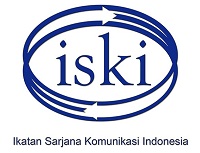Implications of Media Convergence in The Existence of Mass Media in Banten
Abstract
Keywords
Full Text:
PDFReferences
Abbas, S., & Singh, A. K. (2014). Media Industry Trends and Dynamics: The Social Media Boom. Procedia - Social and Behavioral Sciences, 155(October), 147–152. https://doi.org/10.1016/j.sbspro.2014.10.271
Alfani, H. (2020). Local Newspaper Strategy to Survive in the Digital Era. Mediator: Jurnal Komunikasi, 13(1), 118–131. https://doi.org/10.29313/mediator.v13i1.5788
ALWOOD, E. (2007). Dark Days in the Newsroom, McCarthyism Aimed at the Press. Philadelphia: Temple University Press.
Ashari, M. (2020). Changes In Organic Composition of Capital Behind Pikiran Rakyat Strategy of Convergence. MediaTor: Jurnal Komunikasi, 13(1), 11–23. Retrieved from https://elearning2.unisba.ac.id/index.php/mediator/article/view/5126
Cresswell, J. (2015). Penelitian Kualitatif dan Desain Riset (Memilih Diantara Lima Pendekatan) (3rd ed.). Yogyakarta: Pustaka Pelajar.
Cresswell, J. W. (2015). Research and Design (Pendekatan kualitatif, kuantitatif, dan mixed) (3rd ed.). Yogyakarta: Putaka Pelajar.
Fachruddin, A. (2019). Journalism Today (1st ed.). Jakarta: Prenadamedia Group.
Fiske, J. (2012). Pengantar Ilmu Komunikasi. (H. Dwiningtyas, Ed.) (3rd ed.). Jakarta: Rajawali Pers.
Hemmingway, E. (2007). Into the newsroom: Exploring the digital production of regional television news. Into the Newsroom: Exploring the Digital Production of Regional Television News. https://doi.org/10.4324/9780203940679
Khadziq, K. (2016). KONVERGENSI MEDIA SURAT KABAR LOKAL (Studi Deskriptif Pemanfaatan Internet Pada Koran Tribun Jogja dalam Membangun Industri Media Cetak Lokal). Profetik: Jurnal Komunikasi, 9(1), 5–20. https://doi.org/10.14421/pjk.v9i1.1187
KPI. (2013). Frequency Sovereignty. Broadcasting Regulation, Role of KPIs, and Media Convergence. Jakarta: Kompas.
Krisyantono, R. (2014). Teknik Praktis Riset Komunikasi. Jakarta: Prenada Media.
Little John, K. F. (2016). Ensiklopedia Teori Komunikasi. Jakarta: Kencana.
Ludes, P. (2008). Convergence and fragmentation: Media technology and the information society. Convergence and Fragmentation: Media Technology and the Information Society (Vol. 5). https://doi.org/10.1108/00242531011053986
Luik, J. (2020). New Media An Introduction. Jakarta: Kencana Prenadamedia Group.
McQuail, D. (2011). Teori Komunikasi Massa Edisi 6. Jakarta: Salemba Humanika.
Moleong, L. J. (2017). Metode Penelitian Kualitatif Edisi Revisi (Revisi). Bandung: Remaja Rosdakarya.
Prayogi, I. A., Sjafirah, N. A., Ariadne, E., & Dewi, S. (2020). IKATAN SARJANA KOMUNIKASI INDONESIA, 5(2), 199–204.
Putri, D. W., Hamdan, S. R., & Yulianti, Y. (2017). Perilaku Bermedia Digital Dalam Pelaksanaan Tridharma Perguruan Tinggi Dikalangan Dosen Unisba. Mediator: Jurnal Komunikasi, 10(1), 11–24. https://doi.org/10.29313/mediator.v10i1.2731
Ri’aeni, I., & Sulistiana, W. (2018). Industri Media Massa Lokal dalam Tinjauan Manajemen Media Ideal. JIKE : Jurnal Ilmu Komunikasi Efek, 1(1), 86–97. https://doi.org/10.32534/jike.v1i1.51
Sumadiria, H. (2012). Jurnalistik Indonesia Menulis Berita dan Feature. Bandung: Simbiosa Rekatama Media.
Szabo, L.-V. (2014). The Future of Communication: From new Media to Postmedia. Procedia - Social and Behavioral Sciences, 163, 36–43. https://doi.org/10.1016/j.sbspro.2014.12.283
Wahyuningsih, T., & Zulhazmi, A. Z. (2020). Jurnalisme Era Baru (Konvergensi Media Radar Jogja Dalam Menghadapi Persaingan Media). Academic Journal of Da’wa and Communication, 1(1), 76. https://doi.org/10.22515/ajdc.v1i1.2412
DOI: https://doi.org/10.29313/mediator.v15i1.9964
Refbacks
- There are currently no refbacks.

This work is licensed under a Creative Commons Attribution 4.0 International License























